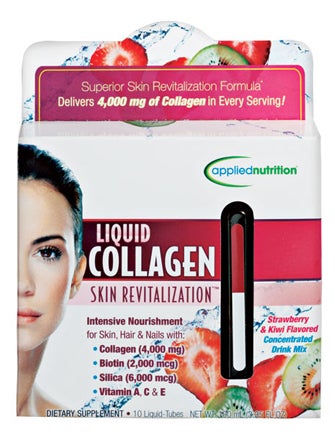The Truth About Collagen Drinks
 Photo: Via Pure Gold.
Photo: Via Pure Gold.
Update: While we originally reported on this topic back in 2013, thanks to new research, collagen drinks are apparently a thing again. A study published in this month's Journal of Cosmetic Dermatology found that women who've added collagen peptides into their routines not only improved their skin moisture, but that the peptides "reduce the fragmentation of the dermal-collagen network, thus counteracting one of the hallmarks of skin aging."
Interested in learning more about collagen drinks? Read ahead.
This story was originally published on October 16, 2013.
As any mildly intelligent human being knows, what you eat can have a direct impact on the way you look. So, it makes sense that we would want to do everything in our power to ingest the things that will make our skin look its glowiest, smoothest, and healthiest. This, at least is the thinking behind the latest skin-care craze, drinkable collagen.
AdvertisementADVERTISEMENT
Originating in Asia, liquid collagen first started popping up on our shores all the way back in 2012. Since then, the hype around these supplements has exploded, with tons of products hitting shelves everywhere from your local drugstore to VitaminWorld. Some women, eager to share their newfound "miracle" product, are now throwing collagen-drinking parties. Botox parties are so 2008, you guys.
The theory behind these beauty elixirs is that by drinking the collagen-and-vitamin cocktails on the daily, you'll help boost collagen production in your skin, which will in turn lead to a healthier, younger complexion. That's all well and good except for, you know, science.
 Photo: Via Target.
Photo: Via Target."The makers of these drinks want you to believe that the collagen you are ingesting will be delivered directly to the skin and have benefits there," says Dr. Neal Schultz, an NYC-based dermatologist and founder of Derm TV. "Collagen is a protein, and proteins are made up of amino acids. That collagen is going to be broken down into amino acids by the enzymes in the stomach, then will be absorbed into the body to be used where the body needs it. It is just the most absurd suggestion that you can push collagen through your bloodstream and have it pump out collagen in your skin."
This also holds true for eating collagen directly — say, from something like a pig's foot. One R29 editor's mother swears by eating a pig's foot each week to help keep her skin radiant. Other than grossing out her daughter, turns out this isn't technically doing her skin any good. In fact, according to Dr. Schultz, the recipient cells receiving the broken-down amino acids don't recognize if that collagen came from a liquid collagen drink or a hamburger — protein is protein to them.
AdvertisementADVERTISEMENT
If you really want to have any sort of impact on collagen production, Schultz says your best bet is increasing your levels of vitamin C, which is used in the production of collagen. "When you take vitamin C, it is absorbed as an intact molecule — not broken down," he explains.
Now, many women who take drinkable collagen on the reg swear that it makes a huge difference in their skin, science and skin experts be damned. More power to them if that's something that they feel is working for them, but we're not dropping our hard-earned cash on something multiple experts say has no scientific proof.
Our take on this trend: You could shell out $20 for liquid collagen that has questionable benefits, or you could spend $3 for a bottle of vitamin C that has proven efficacy. We think that choice is pretty clear, no?
Like this post? There's more. Get tons of beauty tips, tutorials, and news on the Refinery29 Beauty Facebook page!
AdvertisementADVERTISEMENT






